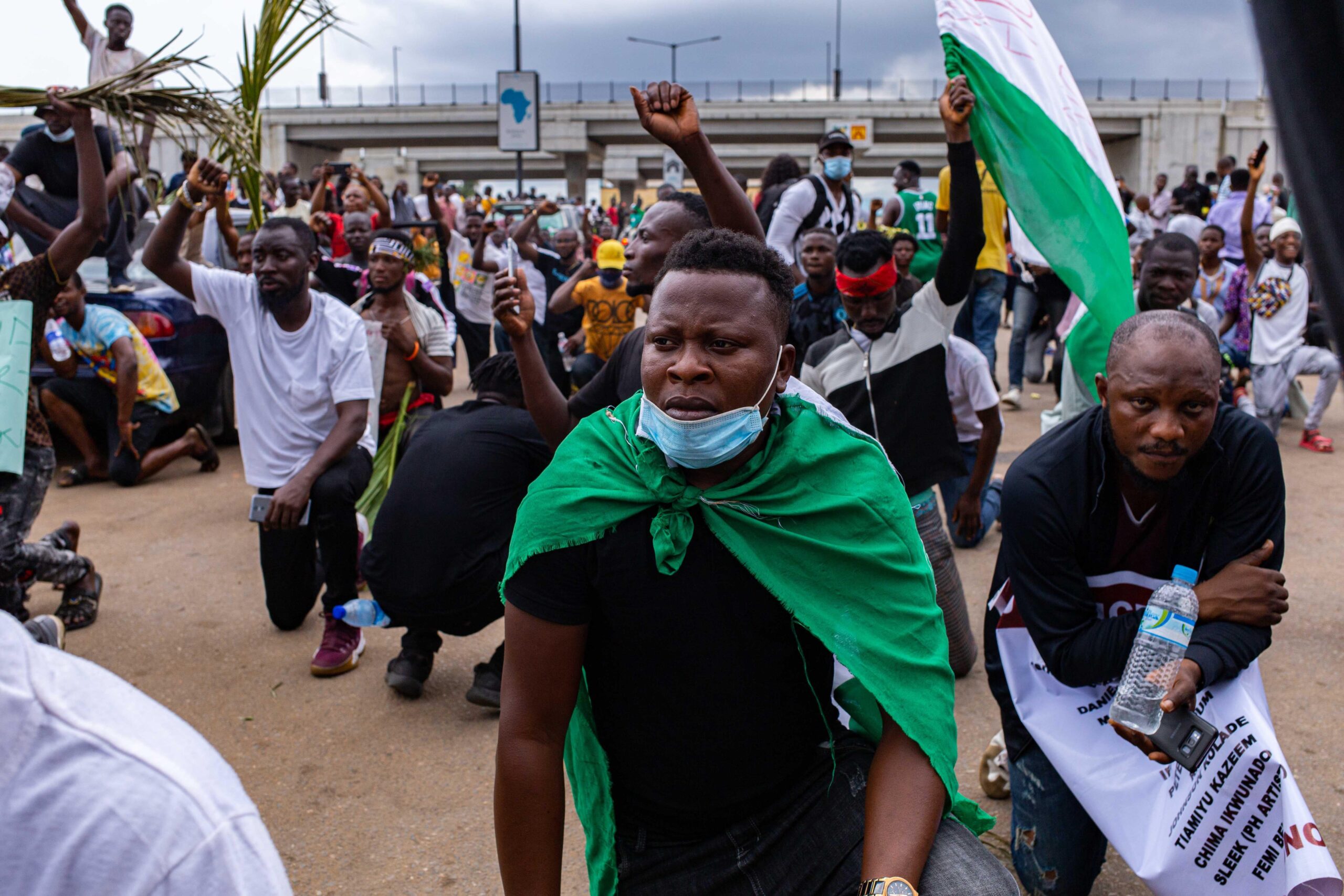
The Cries of the Hungry
In the heart of our land, where shadows fall deep,
A cry rises up, where the sorrow does seep.
From Lagos to Kano, in towns far and wide,
A nation in hunger, too long denied.
Our mothers and fathers, their faces so worn,
By policies cruel, their hope now torn.
Children’s bellies empty, eyes void of light,
In the silence of night, they whisper their plight.
We hunger for justice, for a meal on our plate,
For the leaders who promised, but failed to relate.
Policies broken, dreams left to die,
Under the vast, indifferent sky.
Can you hear our pleas, in your marble halls?
Or see the despair as our spirit falls?
For every naira wasted, a family cries,
Every corrupt deal, a piece of us dies.
Oh, hear our call, in this land of the sun,
Where the battle for fairness has just begun.
We march in the streets, with fire in our eyes,
For the right to live, for the end to lies.
Let not the police silence our song,
For our cause is just, our spirit strong.
In peace we stand, our hearts intertwined,
For the dawn of a future where hope can find.
Empathy and change, we demand with might,
End the hunger, end the fight.
We are Nigeria, proud and true,
Together we’ll rise, justice to pursue.
In the depths of our struggle, we find our voice,
Against the tide of neglect, we make our choice.
To stand, to speak, to hunger no more,
Till justice and fairness walk through our door.
Aluta continua, the struggle remains,
Till the shackles of hunger are forever unchained.
Hear us, oh leaders, our plea is sincere,
For a Nigeria where no one lives in fear.
By: Jide Adesina
for 1st Afrika
@2024 All rights reserved.

The nationwide hunger strike in Nigeria, organized by various civil society groups and young Nigerians under the #EndBadGovernance banner, has begun across multiple states and cities. These protests are driven by widespread dissatisfaction with the current economic conditions and the policies of President Bola Tinubu’s administration.
Key cities and states where protests have been reported include Lagos, Abuja, Abia, Plateau, Kaduna, Kano, Cross River, Ebonyi, Enugu, Kwara, Ogun, Imo, Ondo, and Edo. The protests are largely fueled by the removal of fuel subsidies and rising living costs, which have severely impacted the populace.
The Nigeria Police Force, alongside the Nigeria Security and Civil Defence Corps (NSCDC), has deployed significant personnel across the country to manage the protests. The NSCDC has specifically deployed 30,000 personnel to ensure the protests remain peaceful and to prevent criminal elements from hijacking the demonstrations. They have emphasized the importance of respecting protesters’ rights while also protecting national infrastructure and ensuring public safety.
The international community, including the US, UK, and Canada, has issued travel advisories to their citizens in Nigeria, warning them of potential violence and advising them to avoid protest areas
For effective crisis management and policing of the protests, several measures can be implemented:
Non-Lethal Crowd Control: Employing non-lethal methods such as tear gas, water cannons, and rubber bullets to manage crowds without causing fatal injuries.
Dialogue and Engagement: Establishing open lines of communication between protest leaders and law enforcement to address concerns and mitigate tensions.
Training for Law Enforcement: Providing comprehensive training on handling protests, emphasizing de-escalation techniques and the protection of human rights.
Monitoring and Intelligence: Utilizing intelligence to identify and isolate potential troublemakers without disrupting peaceful protesters.

Community Policing: Engaging with community leaders to foster trust and cooperation, ensuring protests are monitored and managed with the community’s involvement.
It’s crucial for the police to avoid excessive use of force, including shooting or unwarranted arrests of protesters, as this can escalate tensions and lead to further unrest. Respecting the right to peaceful protest and maintaining order through strategic, non-violent means will help manage the situation effectively and protect lives
Warning to the Police: Do Not Kill or Harm Protesters
We issue a strong warning to the police forces: under no circumstances should you resort to killing, shooting, or unjustly arresting protesters. These actions not only violate fundamental human rights but also exacerbate tensions and lead to further unrest.
Right to Protest
Peaceful protest is a constitutionally protected right. Citizens are entitled to express their grievances and demand change without fear of violent retaliation. Any attempt to suppress this right through brutality or lethal force is unacceptable and will not be tolerated.
Accountability and Consequences
Non-Lethal Methods: Police must employ non-lethal methods of crowd control and prioritize de-escalation tactics. The use of live ammunition or excessive force is strictly prohibited.
Legal Repercussions: Any officer found engaging in unlawful violence against protesters will be held accountable to the fullest extent of the law. The government and international human rights organizations are closely monitoring these actions.
Urgent Appeal to Authorities
We call on the government and law enforcement agencies to uphold the principles of democracy and protect the lives of all citizens. The world is watching, and any abuse of power will have serious domestic and international consequences.
To the Protesters
Maintain peace and order during your demonstrations. Your fight is just and your right to protest is protected, but violence will only harm your cause. Protest with discipline and respect for public property.
Let this be a clear message to all: the rights and lives of citizens must be respected. Police brutality and the killing of innocent protesters are intolerable and will face severe repercussions. Stand down and protect our democracy by safeguarding the right to peaceful protest.
Crisis Management and Policing Gen Z Protesters: Solutions for Non-Violent Engagement
Managing protests, especially involving Gen Z, requires a nuanced approach that prioritizes non-violence and constructive engagement. Here are strategies for effective crisis management and policing that can prevent escalation and ensure the safety of all involved:
Crisis Management Strategies
Proactive Communication:
Engage Early; Authorities should establish open lines of communication with protest organizers before demonstrations occur. Understanding their demands and intentions can help in anticipating and mitigating conflicts.Clearly communicate government actions and intentions to the public. Misinformation often fuels unrest; transparency can build trust and reduce tensions.
Empathy and Understanding:
Acknowledge Grievances: Publicly acknowledge the protesters’ concerns, showing empathy and a willingness to listen. This can de-escalate tensions and foster dialogue.
Involve Community Leaders: Collaborate with respected figures and influencers who can mediate and advocate for peaceful protest methods.
Preparedness and Training:
Specialized Training: Provide police and security forces with training in de-escalation techniques, crowd psychology, and non-violent intervention strategies.
Crisis Intervention Units: Establish specialized units trained in handling protests without resorting to violence, focusing on negotiation and conflict resolution.
Policing Strategies for Gen Z Protesters
Non-Violent Policing:
Minimal Use of Force: Use the minimum necessary force to maintain order. Avoid lethal measures and prioritize non-lethal methods like verbal warnings, water cannons, and tear gas only as a last resort.
Body Cameras: Equip officers with body cameras to ensure accountability and transparency in their interactions with protesters. Assign officers to work within communities to build trust and understand local issues. This approach fosters a sense of partnership rather than opposition.
Deploy officers trained in dialogue and mediation to engage with protest leaders and participants, aiming to address concerns and prevent violence.
Respect for Rights:
Facilitate Peaceful Protests: Designate specific areas for protests to ensure they can proceed without interfering with daily life, while ensuring protesters’ safety.
Avoid Mass Arrests: Focus on de-escalation rather than mass arrests, which can escalate tensions and lead to further unrest.
Handling Gen Z Protesters
Understanding Gen Z Dynamics:
Tech-Savvy Engagement: Use social media and digital platforms to communicate with Gen Z protesters, providing real-time updates and clarifications.
Inclusive Dialogue: Involve Gen Z in policy discussions and decision-making processes, ensuring their voices are heard and considered.
Non-Lethal Crowd Control:
De-Escalation Tactics: Use de-escalation tactics such as negotiation, empathy, and active listening to defuse potentially violent situations.
-Safe Zones: Create safe zones where protesters can assemble peacefully without fear of police intervention.
Mental Health Resources: Provide access to mental health support for both protesters and police officers to manage the stress and emotional impact of protests.
Crisis Hotlines: Establish hotlines for protesters to report issues or seek assistance during demonstrations.
Effective crisis management and policing require a commitment to non-violence, empathy, and open communication. By adopting these strategies, authorities can manage protests in a way that respects the rights of Gen Z protesters while maintaining public order and safety. Prioritizing dialogue and understanding over force can lead to more constructive outcomes and foster a more trusting relationship between the government and its citizens.

